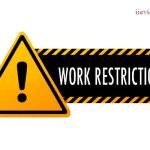What Happens If My Employer Cannot Accommodate Work Restrictions?

Introduction
Getting injured on the job is a real bummer, especially if you’re left dealing with the aftermath. You might need to take some time off to recover, or adjust your work routine to avoid further straining yourself. That’s when your employer is supposed to step in and help you out with some work restrictions. But what happens if my employer cannot accommodate work restrictions? That’s the big question, and we’re about to dive into the nitty-gritty details.
Understanding Work Restrictions
Work restrictions are adjustments made to your work routine to help you recover from an injury or illness. These restrictions might include things like reduced work hours, modified job duties, or even a temporary transfer to a different role. The goal is to help you heal while still allowing you to do some work.
When Employers Can’t Accommodate Restrictions
So, what happens if my employer cannot accommodate work restrictions? Well, sometimes employers just can’t make the necessary adjustments to help you out. Maybe they don’t have the resources or flexibility to provide the accommodations you need. In this case, things can get a bit tricky.
What Happens If My Employer Cannot Accommodate Work Restrictions and I’m Disabled?
If you’re dealing with a disability that requires certain accommodations, and your employer can’t provide them, you might be entitled to some protection under the Americans with Disabilities Act (ADA). This federal law requires employers to provide reasonable accommodations for employees with disabilities, unless doing so would cause an undue hardship.
However, what happens if my employer cannot accommodate work restrictions and claims it’s because of an undue hardship? In this case, the employer needs to show that providing the accommodations would cause significant difficulty or expense. If they can demonstrate this, they might be able to avoid providing the accommodations.
What Happens If My Employer Cannot Accommodate Work Restrictions and I Need to Take Time Off?
If you need to take some time off to recover from an injury or illness, and your employer can’t accommodate your work restrictions, you might be eligible for leave under the Family and Medical Leave Act (FMLA). This federal law allows eligible employees to take up to 12 weeks of unpaid leave per year for certain family and medical reasons.
But what happens if my employer cannot accommodate work restrictions and denies your FMLA leave? In this case, you might need to file a complaint with the U.S. Department of Labor or seek assistance from a state or local labor agency.
Your Rights and Options
So, what happens if my employer cannot accommodate work restrictions? You have some rights and options to consider. Here are a few things to keep in mind:
- File a Complaint: If you think your employer is violating your rights, you can file a complaint with the Equal Employment Opportunity Commission (EEOC) or a state or local labor agency.
- Seek Accommodations Elsewhere: If your employer can’t accommodate your work restrictions, you might be able to find another job or work arrangement that can.
- Negotiate with Your Employer: Sometimes, it’s possible to work out an agreement with your employer to provide some accommodations or find alternative solutions.
- Consider a Leave of Absence: If you need to take time off to recover, you might be able to negotiate a leave of absence or use up some vacation time.
Next Steps
If what happens if my employer cannot accommodate work restrictions is a concern for you, here are some next steps you can take:
- Talk to HR: Start by talking to your HR department to see if they can help you work out a solution.
- Consult with a Lawyer: If you’re unsure about your rights or need help negotiating with your employer, consider consulting with a lawyer.
- Explore Alternative Options: Look into other job opportunities or work arrangements that might be a better fit for your needs.
Conclusion
What happens if my employer cannot accommodate work restrictions? It’s a tough spot to be in, but there are options and resources available to help. Remember to communicate with your employer, explore alternative solutions, and don’t be afraid to seek help when you need it. With a little persistence and determination, you can find a way to recover and get back to work.
Closing
So, what happens if my employer cannot accommodate work restrictions? The answer might be more complicated than you thought, but with the right knowledge and resources, you can navigate this challenging situation and come out on top.
<